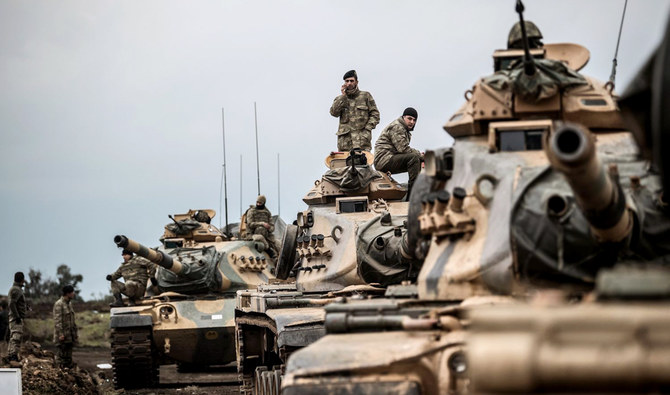ANKARA: An increase in Turkish military deployments near the Turkish-Syrian border has raised fears of an extensive conflict east of the Euphrates.
A significant deployment of heavy weapons has taken place near the strategic northern border town of Tal Abyad, controlled by the Syrian Kurdish YPG militia. The control of Tal Abyad helped the YPG connect noncontiguous territory in northern Syria and organizing it into cantons such as Afrn, Kobani and Al-Jazira.
The Turkish operation into Syria might be linked with the risk of approaching US sanctions through the Countering America’s Adversaries Through Sanctions Act (CAATSA) over the purchase of Russia’s S-400 missile defense system.
A US delegation is set to arrive Ankara next week, and military movements by Turkey in Syria are expected to form part of its agenda.
Dr. Sinan Hatahet, a Syrian analyst based in Istanbul, believed that conflict was unlikely because there are ongoing negotiations about the safe zone in northern Syria and Manbij.
“Both countries are still resolved to solve their bilateral issues through diplomatic channels. But if the US impose sanctions, it could harm this long-dated relationship,” Hatahet said.
The Turkish military has initiated troop deployments several times over recent years to put pressure on the US to realize its agreement in the northern city of Manbij.
“The only unique aspect of this deployment is that it is happening just after the delivery of S-400 components. The American priority in Syria is to advance negotiations for a political solution and to challenge Iranian expansion,” Hatahet said.
Mehmet Emin Cengiz, a research assistant at the Al Sharq Forum in Istanbul, said even though Ankara constantly emphasizes its willingness to find a workable solution in northern Syria, US sanction threats could lead Turkey to consider new options.
“If the US decides to impose harsh sanctions that will cripple the Turkish economy, Turkey can go for a unilateral military operation in Northern Syria. Sanctions might trigger a new military operation in the east of the Euphrates,” Cengiz said.
Cengiz believes that Ankara’s decision to amass troops along the Turkish-Syrian border adjacent to YPG-controlled areas is a direct signal to the US.
“Turkey has been losing its patience with the US in recent years. The Manbij issue has been problematic between the two sides for a long time. The shared plan for the city was not implemented for more than a year,” he added.
“The nature and scale of the planned safe zone in Northern Syria is still an issue between the two sides. The US seems to be clear in its decision to back the YPG in the future,” Cengiz added.
According to Cengiz, with this recent military deployment, Turkey is trying to strengthen its hand in response to US threats.
Joe Macaron, a fellow at the Arab Center in Washington, DC, thinks that Erdogan has two goals in mind: Influence Trump’s thinking on sanctions and react to the US’ decision last week to consider deploying European troops along the Syrian-Turkish border.
“Since Trump and his national security advisers are not talking in one voice on the S-400, Erdogan is trying to weigh in on this debate by highlighting the potential risks to US forces, however this move might further antagonize the US against Ankara,” he said.
“While Erdogan is trying to have leverage over the upcoming talks between the Turkish and American militaries regarding northern Syria, the unintended risk is provoking a confrontation with Kurdish forces, which might increase the cost of Turkish intervention in Syria at a critical time in Erdogan’s political future,” Macaron said.
In addition to CAATSA sanctions, Ankara could likely face punitive measures from Brussels. In response to Turkey’s gas drilling activities in Cypriot waters, the EU is also threatening to cut pre-accession funding to Ankara by €145.8 million ($164.6 million), Politico recently reported.
















